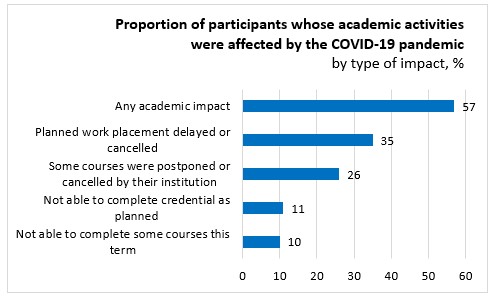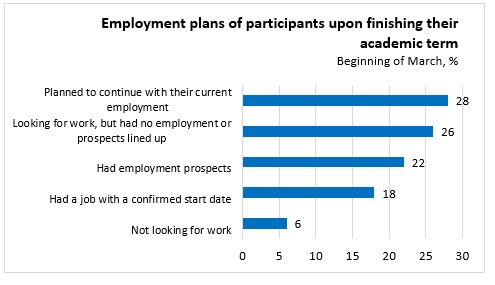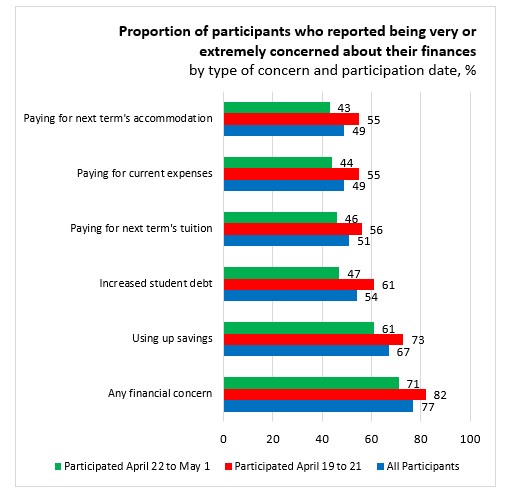The Economics and Statistics Division maintains archives of previous publications for accountability purposes, but makes no updates to keep these documents current with the latest data revisions from Statistics Canada. As a result, information in older documents may not be accurate. Please exercise caution when referring to older documents. For the latest information and historical data, please contact the individual listed to the right.
<--- Return to Archive
For additional information relating to this article, please contact:
May 12, 2020IMPACTS OF THE COVID-19 PANDEMIC ON POSTSECONDARY STUDENTS Recently, Statistics Canada developed a new initiative to generate data and analysis quickly and effectively using crowdsourcing. Crowdsourcing questionnaires are being launched regularly to get timely information about important issues, such as the extent to which COVID-19 is affecting the lives and well-being of different groups of Canadians. From April 19 to May 1, 2020, over 100,000 postsecondary students participated in an online crowdsourcing data collection about how the COVID-19 pandemic is impacting their academic, labour market and financial situation. The focus of this release is looking at the initial results from this questionnaire.

More than half of the participants (57%) reported that their academic work placements or courses were either delayed, postponed or cancelled due to the impacts of COVID-19 pandemic.
The most common issue among participants was a delay in or cancellation of their work placement (35%). Just over one-quarter (26%) reported that some of their courses were postponed or cancelled by their institutions, including course work such as labs, applied learning and hands-on instruction that cannot be delivered online. 11 per cent of participants indicated they were not able to complete their degree, diploma or certificate as planned, while 10 per cent were not able to complete some of their winter-term courses.
The results among participants expecting to graduate in 2020 were similar to those reported by continuing students with one exception. Twice as many prospective graduates (17%) reported that they would not be able to complete their degree, diploma or certificate as planned compared to 8 per cent for continuing students.

At the beginning of March, two-thirds of participants reported having firm employment plans or prospects upon finishing their academic term while 26 per cent of participants were looking for work, but had no firm prospects and 6 per cent were not looking for work.
Among the participants who planned to continue working at the job they held at the beginning of March, the majority had either lost their job (21%) or been laid off (34%) two months later. Less than one-quarter (24%) were continuing to work as planned while 26 per cent were working fever hours.
The results were similar among participants who had a job with a confirmed start date at the beginning of March. Almost one-third (31%) reported having lost their job at the time of completing the online questionnaire, with 40 per cent reported that their start date had been delayed and 13 per cent reported that they still had their job.
Of the participants with job prospects at the beginning of March, almost half (49%) reported that they had lost these prospects while only 6 per cent reported that they still had these prospects at the time of this survey.

Overall, 67 per cent of the student participants were very or extremely concerned about having no job prospects in the near future while 58 per cent reported they were very or extremely concerned about losing their job in the future.
The most common concern among participants was using up their savings (67%) followed by concerns around having increased student debt (54%). Just over half of the participants (51%) were concerned about paying for next term's tuition while 49 per cent reported being concerned about paying for current expenses and paying for next term's accommodation.
On April 22, 2020, the Government of Canada announced the Canada Emergency Student Benefit (CESB), which provides financial support to students who are not eligible for the Canada Emergency Response Benefit. The announcement of the CESB occurred partway through the collection of the crowdsourcing exercise providing a unique opportunity to compare the financial concerns reported by participants who completed the questionnaire before the announcement of the benefit with those who completed it after.
Overall, following the announcement of the CESB, the proportion of returning students who reported that they were very or extremely concerned about their finances decreased across all categories. However, 71 per cent of the participants still reported significant financial concerns after the introduction of the CESB benefit.
Prior to the announcement of the CESB, 73 per cent of participants indicated that they were very or extremely concerned about using up their savings which declined to 61 per cent following the announcement.
Similarly, the proportion of participants with significant concerns about paying for tuition next term, increasing their student debt or paying for current expenses declined by 10 to 14 percentage points after the announcement of the CESB, with between 44 per cent and 47 per cent of students reporting they were very or extremely concerned about each of these issues.
Source: Statistics Canada, Impacts of the COVID-19 pandemic on postsecondary students
<--- Return to Archive